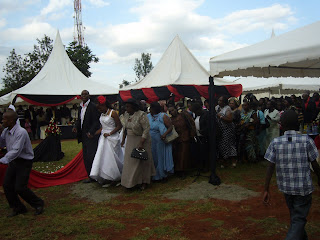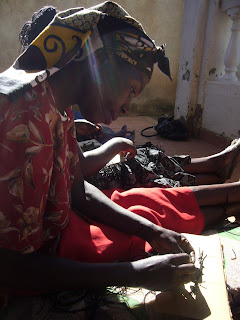Saturday was the day of Gitonga's wedding, I woke up early to make sure that I would be ready on time. I had arranged to call his Canadian friends to share a ride to the location of the wedding at 10. At around 9:50 I got a text message saying they had just got up and were running late. Having been left waiting a couple of other times I decided to get a cab on my own so I called Elijah who at picked me up from the bus station. He said he would be there at 11 as I had requested which was the time the wedding was supposed to start but I was trying to account for "African time" by arriving a few minutes late.
At 11 I went to the gate and Elijah did not appear. After waiting for 10 minutes I called him and he told me he was stuck in traffic but that he would be there soon. After another 10 minutes I called again and he told me that he was just around the corner and that he would be there soon. 10 minutes later I got fed up and was considering taking another cab when he finally arrived. At this point I was quite distressed as, while I concluded that the wedding would start late I thought that getting there an hour late might be too late. Nevertheless I got in the car and told him that I was going to the Kenya Water Institute and he assured me he knew where it was. After driving for about 20 minutes I started to wonder if he knew where he was going so I asked if we were almost there he assured me he did and it was right around the corner. We went around the corner, and then another and another and so I asked again and he assured me it was just around the next corner. 10 minutes later we were at the far end of the district we were supposed to be in so I asked again and so I told him I thought he didn't know where he was going so he should stop and asked for directions. He returned to the car looking confused and said that no one seemed to know where it was. So for the fourth time during the trip I repeated that I was going to the Kenya Water Institute to which he responded "Oh, the Kenya WATER Institute? I thought you said the Kenya Institue. I know where that is, that's back the way we came" so we started driving again and I called Gitonga's friend to get better directions. In the end we had to stop and ask for directions again and by the time we made it to the Kenya Water Institute it was 12:30. I was beside myself, I thought that I had missed the wedding that I had travelled all the way from Kampala to attend. I informed the driver that in the future if he cannot pick someone up on time he should not say that he will and that he needed to ask for clarification if he didn't know where he was going and I gave him less money than our negotiated price.
As I walked into the location there was a splattering of people present but the seats weren't even half full and there seemed to be a lot of set up going on. I leaned into someone and asked whether this was Gitonga's wedding and it was, and I hadn't missed it they were running late.

So I sat down and waited. After 30 minutes someone spoke over the microphone and said there was no problem and that they were just setting up and that the wedding would start soon. After 45 minutes Gitonga's friend who I had met the night before came to explain to me that the company that was providing the tents for the wedding had not shown up and that was why they were behind. after another 30 minutes someone again assured the crowd that the wedding would be starting soon. After 2.5 hours the wedding finally started, you could see the strain on the faces of the bride and groom. Incidently my new Canadian friend arrived just a the wedding was starting. Good timing.
The wedding itself was very lovely. The site was decorated in red and black with elaborate flower boquets and the wedding party had 5 bridesmaids and grooms men. The ceremony was led by a pastor from Winnie and Gitonga's church which discussed the origins of marriage in the bible starting from the creation story, which was a bit long. The said their vows, signed their marriage llicense and briefly absconded for photos while the guests were arranged for the lunch which was served at about 4:30. The lunch was very nice and again there was no matooke. During the meal I went to put my present on the gift table and Gitonga called me over after talking for a little while I leaned in and said "this is going to be my first law suit" referring to the problems with the wedding company.

Following the meal there were some traditional ceremonies. First the parents of Winnie and Gitonga each gave them gifts. Winnie was given all of the things she would need to be a "good wife" including a basket for fetching things from the market and a cooking basket. She also received advice from her aunties about how to be a good wife. Gitonga's parents gave them what we understood to be 100 acres of land which they said he could either cultivate or sell, but either way that's a pretty spectacular gift. This was followed by a bed making ceremony which is traditional in many parts of Kenya. Basically the Bride's family buys furnishing for the couple's new home including a bed and set it up like a house. The bride is responsible for making the bed (although in this case she didn't because of time constraints) and then the couple sit on the bed as well as couches for the first time as a married couple. This was a really interesting tradition to watch unfold. Following this the cake was cut and shared and we were on our way.
Later in the evening I was invited to attend an after-party for the wedding. I was invited for 8 so I arrived at 9:15 and of course it was another hour before anyone else arrived. It was at a very nice bar called Caribana which offered western style drinks, I had a strawberry daquri which was a different interpretation of the original but still delicious and much less expensive than the mixed drinks in Kampala. Of course the best part of the evening was getting to spend time with Winnie and Gitonga. I hadn't met Winnie before so I learned a lot about her and it was lovely to get to have the time to catch up with Gitonga. I wasn't sure if I was really going to have time to interact with him at all because of the pomp and circumstance that surround weddings.
On the Sunday of my trip I met the four Canadians I had met for breakfast at the mall. I decided to take it easy, bought three loaves of bread and did some walking and visited the apartment where the Canadians were staying. On the way back to Hibiscus I passed some children playing in the shade. A few steps later I heard footsteps and one of the little boys was standing next to me and asked if I could spare any food. Knowing I had three loaves of bread I offered part of one loaf to he and his friends, he thanked me very much. It was nice to be able to do that since I feel like I cannot in Kampala where the children who beg are being exploited. There are most likely exploited children in Nairobi as well but the request seemed like a spontaneous one rather than a coerced one.
Before leaving for the bus I had Ethiopian food for dinner which was great so I left happy. On the way out one of the guards stopped the car and basically asked if I was going to tip him. I declined remembering that it was inappropriate to tip in Uganda. Unfortunately I was later informed by my driver that Kenyans pretty much tip for everything which I was very upset to learn since I hadn't thought to tip any of the staff, but it was too late.
On the bus on the way back to Nairobi one of the attendants proposed marriage to me which was less than appreciated and a bit more direct than most Ugandans. You win some you lose some.

























